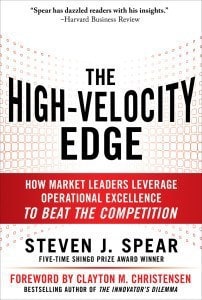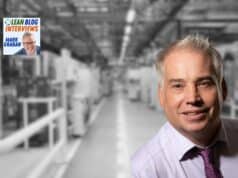Episode #87 is a discussion with a returning guest, Steven J. Spear, DBA, author of the outstanding book Chasing the Rabbit: How Market Leaders Outdistance the Competition and How Great Companies Can Catch Up and Win.
The book is due to be re-released in May under a new title, The High-Velocity Edge: How Market Leaders Leverage Operational Excellence to Beat the Competition.
Steve shares his perspective on how healthcare organizations can achieve what he calls “high-velocity performance”–delivering higher quality care to more people, at lower cost, while making work easier for staff. Drawing from his research on Toyota and other high-performing organizations, he explains why sustained success comes from broad-based, nonstop improvement and innovation rather than one-time projects or heroic ideas.
The conversation touches on lessons from Toyota's quality challenges and how they affect the way leaders in healthcare think about Lean. Steve emphasizes the need for scientific problem-solving, designing systems that make problems visible, and creating leadership habits that cultivate engagement at every level. He also previews an Institute for Healthcare Improvement (IHI) workshop he was leading at the time, focused on helping healthcare executives and improvement professionals apply these principles to their own organizations. Listeners will take away powerful ideas about the role of leadership, learning, and culture in sustaining improvement that truly outpaces the competition.
For earlier episodes, visit the main Podcast page, which includes information on how to subscribe via RSS or via Apple Podcasts.
Transcript:
Mark Graban: Hi, this is Mark Graban. You are listening to episode 87 of the Lean Blog podcast for March 30th, 2010. Our guest today is Steven Spear. We're going to be talking about lean and healthcare and some of the impact that Toyota's quality problems have had in people's thinking about the applicability and the adoption of lean methods and management practices in healthcare. So an interesting chat to come. I would invite you to visit my blog at leanblog.org. You can find past episodes of the podcast at leanpodcast.org or leanvideopodcast.org. You can also follow me on Twitter,
twitter.com/markgraban. Thanks for listening.
Well, I'm happy to welcome back to the podcast, Steven Spear. Thanks for joining us today.
Steve Spear: Oh, you're quite welcome. Thanks for having me on.
Mark Graban: Sure. It's great to have you back. And listeners, I'm sure know of you from your book, your outstanding book,
Chasing the Rabbit, which is due to be re-released in May under the new title, High Velocity Edge. And from Steve's blog, HBR articles, and Bloomberg appearances, I'm sure you've seen and heard Steve before. But we're going to talk today about an upcoming workshop from the Institute for Healthcare Improvement,
How Market Leaders Outpace the Competition: High Velocity Healthcare Organization. So Steve, I was wondering if you could tell us about that workshop, what people would learn, what is a high-velocity healthcare organization?
Steve Spear: Sure. I'd be happy to answer all those questions. So the workshop is going to focus on a basic point, which all of us who have been in the thick of improving healthcare over many years know, which is that it's very possible to move the needle quite significantly and simultaneously on quality of care, access. So not only higher quality, but for many more people. And all the while reducing the cost of providing that care, whether it's measured in a per-unit basis or an aggregate basis. And all that comes while making the work of healthcare professionals easier. So, higher quality for more people at less cost, with less overburden for healthcare professionals.
The point of the workshop is to assemble people in Scottsdale. This is in April. And primarily two groups of people: those who lead organizations from fairly senior levels, chiefs of medicine, president CEOs, COOs, chief nursing officers, and folks like that who are challenged with the daily responsibility of improving across that spectrum of measures–quality, access, affordability, and staff overburden. The other group we are particularly eager to target with this workshop are those folks whose day-to-day responsibility is in some form of quality improvement, patient safety, continuous improvement, lean, Six Sigma. There are many different titles, but they all address, different words to describe exactly the same role. The people who are supposed to be the subject matter experts on process excellence and bring that subject matter expertise into their organization.
Mark Graban: So you're teaching about how to engage and bring in that internal expertise. I was wondering if you also touch on, you know, I think one of the themes that came out very strongly in your book was the idea of learning from other industries. So I was wondering if you could touch on some of the ways that healthcare can learn from examples of high-velocity organizations and their practices from outside of healthcare.
Steve Spear: Sure. So one of the things we're going to continue to emphasize in this workshop is the idea that it is possible to achieve very, very high levels of performance. In healthcare, the measures of concern are quality, access, affordability, and staff overburden. The point is, whatever you are concerned with, you can achieve very, very high levels of performance. And in doing so, you'll really set yourself apart from your rivals or your peers. The ability to achieve those very high levels of performance depends on first generating and then sustaining very broad-based, high-speed, nonstop improvement and innovation.
When people hear the word improvement and particularly innovation, it's actually interesting, they come up with two notions. One is that somehow improvement is this very rote application of known tools. It kind of begs the question, if the tools are known and it requires only rote application, why haven't people done it already? And then there's the other word, innovation, which often gets interpreted and I think misinterpreted as somehow the kiss of inspiration on the brow of a genius that somehow someone like Archimedes steps into a tub, displaces his water, and all of a sudden screams “Eureka” when he understands things about mass and volume. I couldn't disagree more strongly with either of those conventional wisdoms.
In fact, I think there's very, very strong evidence that the ability to make complex systems better is actually rooted in a basic science of systems. In terms of how they're designed, so they're predisposed to be improved, how they're operated, and then how that improvement actually is carried out with great rigor and discipline. In the workshop, we're going to explore what that basic science is. In terms of designing systems to see problems, solving problems to create new knowledge, to take that new knowledge which is discovered through solving individual or a few problems, and giving it broad application. And then to this point of leadership and engagement, really hone in on what it means to be an engaged leader in an organization which is trying to get ahead by generating and sustaining this broad-based, high-speed, nonstop improvement and innovation.
Mark Graban: That's great. And well, I guess one final question for you, maybe a little bit outside the scope of the workshop. I'm curious about your perspective. Talking to healthcare leaders and executives, what have their reactions been to some of the recent Toyota quality problems? Are you finding that it's at all shaking their belief that the Toyota-based methods, or lean, if you will, can have an impact in their industry? What are you hearing from them?
Steve Spear: So, it's a great question. I would say that Toyota's recent experiences around quality may not have so much changed people's opinions, but have brought their opinions into much sharper relief than they might have in the past. When we consider Toyota's experience, it's quite extraordinary actually, because Toyota went from being an exceptionally uncompetitive carmaker in the late fifties. Their first product in the United States was something called the Toyota Pet. It was small, underpowered, and it had the distinction of going uphill more reliably in reverse than forwards. And not only was it a crummy car, but Toyota was terribly ineffective in producing it, with labor productivity one-eighth that of its American counterparts.
By the sixties, Toyota had closed the gap on productivity. By the seventies, it's re-emerging in the US market with small cars, which were affordable because of the productivity and exceptionally reliable. And that became the wedge for Toyota to start designing, producing, and selling mid-size and large cars, then pickup trucks, SUVs, minivans, and the like. And Toyota continued, despite tremendous attempts by others to first study and then imitate and replicate its performance. It just continued to run away from its competition, not only with new products, but new brands–Lexus and Scion, for example–new markets and new regions–Europe, Asia, South America, and so forth–and brand new technologies. The Prius hybrid was up to about a million copies before anyone even had something comparable on the road.
So when you look at Toyota, you have to really ask the question, how did they, responsible for such complex work of complex products and complex production systems, manage to generate and then sustain improvement and innovation on a broad-based, high-speed, nonstop fashion over three or four decades? So for the folks who are already looking at Toyota and saying, ‘Jeez, there's something there we can learn about managing our own systems of great scientific and technological complexity, there's something there for us to learn to get much, much better'. I think those folks look at the current situation of Toyota and say, well, you know, 8 million car recalls is an awful lot, but it was prompted by 17 accidents. And so for them, they keep saying, you know, what this does is it reinforces the power of this basic science of systems. How to design, operate, and improve systems for relentless betterment. What it also does is call into very, very sharp attention the importance of leadership and maintaining the nurturing and the cultivating the application of the capabilities to apply that basic science to the work you do.
So that's one group. They already knew Toyota had some lessons to learn, and if anything, this just reinforces the importance of leadership and engaging the organization as a whole. And then there's the other part, which always looked at Toyota as, ‘Well, you know, they make cars, we don't make cars, so we're not really, we'll go through the motions of acknowledging them'. So for those folks, they say, ‘Oh, well, look, you know, Toyota stumbled'. I mean, they still stumbled to a level of safety far greater than most hospitals in the United States.
Then there's the other group which looked at Toyota for lessons and thought the lessons were more about turnkey off-the-shelf engineering tools, which could be used in a very literal fashion to engineer chaos out of systems and engineer stability in. And for those folks, they were never really interested in getting engaged as active leaders cultivating the skills and expertise of people within their organizations. So it's not clear those folks' behaviors change, this just gives them an excuse not to do what they really should be doing. The long and short of it, I think Toyota's experiences over four or five decades and over the last four or five months have for one camp really reinforced their commitment to learning from Toyota and not making the mistakes around emphasis and attention that Toyota might have made. And for the other group who wasn't going to learn from Toyota anyway, it's just given them an excuse not to.
Mark Graban: Well, I want to thank you for sharing your thoughts and perspectives on that, for telling us about the workshop. People can go to ihi.org and look under conferences and seminars, it's pretty easy to find Steve's workshop,
How Market Leaders Outpace the Competition. And could you remind the listeners your personal website, Steve, if they want to learn about you, your book, your blogging, all of that?
Steve Spear: Oh, sure. The easiest way to reach me is at the website we've been keeping for the book, and it's just chasingtherabbitbook.com. You'll find me there, posting about healthcare and autos and other things. And it's a forum for a conversation about these topics. And just one last thing about this workshop. So on the one hand, we hope that the workshop is of great value for the leadership and the subject matter experts in process excellence who show up and attend in terms of providing information to them. Our other hope and our great expectation is that we have people who show up and have a tremendous opportunity to share each other's learnings based on their own experiences and take away things of great value based on what they hear from their colleagues and their peers. When we talk about these high-velocity organizations and identify their capabilities, one of the really great capabilities is this capability to share knowledge gained locally and apply it systemically. And that's a huge multiplier because it means if you, Mark, have a learning, it's not just you've seen a problem, solved the problem, and had one learning, you've seen a problem, solved the problem, and I've learned from it too. And you get this great multiplier. And in Scottsdale, we're really hoping not only to share, but to multiply the tremendous benefits that have come from efforts people have made over the last months and years.
Mark Graban: Well, that sounds good. And thank you for your work and thank you for sharing that with us today on the podcast. I appreciate it, Steve.
Steve Spear: Oh, you're quite welcome, and thanks for the opportunity to speak with you and your listeners.
Please scroll down (or click) to post a comment. Connect with me on LinkedIn.
If you’re working to build a culture where people feel safe to speak up, solve problems, and improve every day, I’d be glad to help. Let’s talk about how to strengthen Psychological Safety and Continuous Improvement in your organization.










[…] LeanBlog Podcast #87 – Steven J. Spear, PhD, Lean in Healthcare […]